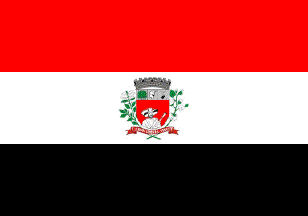 image by Ivan Sache, 18 January 2013
image by Ivan Sache, 18 January 2013
Last modified: 2013-07-20 by ian macdonald
Keywords: sao paulo | presidente prudente |
Links: FOTW homepage |
search |
disclaimer and copyright |
write us |
mirrors
 image by Ivan Sache, 18 January 2013
image by Ivan Sache, 18 January 2013
Other sites:
Presidente Prudente is a city in the east of São Paulo State.
I found this flag at the following web address:
http://www.pucsp.br/~victor/pp/ppband.html
Chris Pinette, 23 April 1997
The flag is a horizontal triband, red, white, and black (the colors of the State of São Paulo), 14:20, with the coat of arms on the center.
The coat of arms is red, representing the courage of the first settlers, with the image of the bandeirante Raposo Tavares.
A chief is tierced in pale, dexter a green forest, center the head of Mercury (for commerce), and sinister a cow's head (for ranching).
The supporters are branches of corn (maize) and cotton. The motto is O trabalho a tudo vence, or "Labor conquers all."
Joseph McMillan, 13 March 2002
An orange variant does not seem to exist in the cloth but is widely propagated, as a drawing, through the Internet.
The municipality of Presidente Prudente (207,625 inhabitants in 2010; 56,211 ha) is located 560 km west of São Paulo. The municipality is made of the town of Presidente Prudente proper and of the districts of Ameliópolis, Eneida, Floresta do Sul and Montalvão.Presidente Prudente developed around the railway station of the same name built by the Sorocabana Railway Co., named for Prudente de Moraes (1841-1902), the 3rd President of Brazil (1894-1898), also President of São Paulo (1889-1890). The town was established as the merger of two urban nuclei, Vila Goulart and Vila Marcondes. Vila Goulart was founded on 14 September 1917 by Colonel Francisco de Paula Goulart, the owner of the Pirapó-Santo Anastácio Estate. Vila Marcondes was founded in 1919 by Colonel José Soares Marcondes, the head of the Cia. Marcondes de Colonização, Indústria e Comércio.
The flag of Presidente Prudente is prescribed by Municipal Law No. 568 of 4 July 1960. The text of the Law does not say explicitly that the stripes of the flag should be of equal size.
The flag used in the meeting room of the Town Hall seems to have equal
stripes, like the drawing shown on the website of the Municipal Council:
http://www.unoeste.br/site/destaques/Noticias.aspx?id=3951
- Photo
http://www.camarapprudente.sp.gov.br/index2.php - Drawing
However, there is also a flag, probably "less official", with a broader central stripe. http://www.sinomar.com.br/portal/coluna.asp?codigo=1247 - Photo
This flag got international fame during the Sydney Olympic Games, when
used by the sprint athlete Claudiniei Quirino to celebrate the silver
medal won by Brazil in 4 x 100 m.
http://fotografia.folha.uol.com.br/galerias/8720-medalhas-do-brasil-em-sydney-2000 - Photo
The coat of arms of Presidente Prudente, designed by Pr. José Machado de Almeida and painted by Pr. Luiza Salvador Damato, is prescribed by Municipal Law No. 5,005 of 17 December 1997 (since the coat of arms already appears on the flag adopted in 1960, "1997" might be an error - unless the original design was amended or not prescribed by any Law until 1997)..
The coat of arms summarizes in a symbolic manner the history as well
as the economical and political build-up of the town.
The Flemish-Iberic style recalls the origins of the Brazilian
civilization, rooted in Portugal, that bequeathed us the language, the
religion and a part of the ethnical composition of Brazil.
The eight-towered mural crown argent represents Presidente Prudente as
an emancipated municipality.
The quarters below the crown [in chief] represent the primary forest
and the courage and intrepidity of the people who established the
town; Mercury's emblem, as the symbol of commerce, and a plough, as
the symbol of field work; three "juntos" recalling the beginning of
the municipal life, when a town emerging from hostile forests was
transformed into the main commercial and agricultural trade center in
the triangle formed by the Paraná, Mato Grosso and São Paulo States.
In the middle of the shield is represented the pioneer Raposo
Tavares*, as a tribute to all the pioneers who settled the region,
sailing on rivers Paranapanema and Paraná with their troops, in 1627.
The shield is supported dexter by a plant of peppermint and sinister
by a plant of cotton, recalling that the town is the main center of
production of peppermint and cotton in Brazil.
Below the shield, a scroll argent (gules on the coat of arms used on
the flag) is inscribed with the motto "LABOR OMNIA VINCIT" (Labour
Always Win).
http://museu.presidenteprudente.sp.gov.br/historiapp.php - Presidente Prudente Municipal Museum website
*António Raposo Tavares (1598-1658), the "legendary pioneer", led his
first expedition in 1628, which allowed the annexation of the current
States of Paraná and Santa Catarina to Portugal. He led a second
expedition in 1636, which allowed the annexation of the current state
of Rio Grande do Sul. His last and most famous expedition trailed in
1648 from São Paulo to Belém. Out of the 1,200 members of the
expedition, only 60 reached Belém, including Tavares himself.
Ivan Sache, 18 January 2013